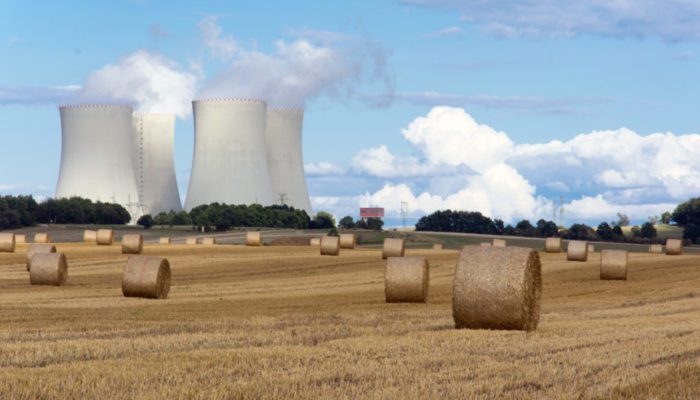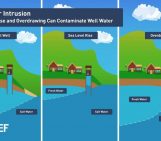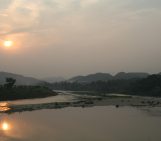
Each month, Jesse Zondervan picks his favourite posts from geoscience and development blogs/news which cover the geology for global development interest. Here’s a round-up of Jesse’s selections for the last month:
As temperatures in Europe surge, one may not find it difficult to imagine water will be in demand. However, nearly one-fifth of the world’s population lives in a stressed water basin. A study published in Nature Sustainability points towards the inflexibility of our water demands. To ensure resilience to climate-change driven droughts, we better start looking for opportunities to save or build elsewhere or look for other sources.
On a positive note, this month such a new source was found off the coast of the US Northeast. Mapping of the ocean floor with electromagnetic waves revealed aquifer of fresh water underneath the salty ocean, starting at 180 m beneath the seafloor, extending 50 miles to the edge of the continental shelf. Similar deep offshore aquifers might be waiting to be found elsewhere in the world.
Tokyo and Sichuan – Earthquake resilience in Asia
This week The Guardian explores Tokyo, naming it the world’s riskiest city and one of its most resilient. The scale of the city, its risks and its efforts to build resilience are evident in the way Tokyo deals with the prediction of day X. Experts estimate a 70% chance of a magnitude 7 hitting Tokyo before 2050. With the added pressure of the 2020 Olympics Tokyo is preparing evacuation plans, and decided to cut the number of spectators for the sailing event to be better able to deal with the tsunami risk.
Over in China, a magnitude 6 earthquake struck Sichuan this month. Professor Wei Shengji considers whether human activities might have increased seismic activity, a topic also discussed in South Korea’s Pohang where there seems to be no doubt a geothermal energy project is to blame. The impact of disaster risk reduction efforts is unmistakable in the case of Sichuan, where forward thinking and the installment of an earthquake early warning system saved hundreds.
More this month, how citizen scientists can help predict and prepare for disasters, how airlines decide whether to fly near volcanoes and the challenge of dealing with the risk of tailings dam failures in the mining industry
Sustainability
Combination of water scarcity and inflexible demand puts world’s river basins at risk at UCI news
Scientists Map Huge Undersea Fresh-Water Aquifer Off U.S. Northeast by Kevin Krajick at State of the Planet
Tokyo
‘This is not a “what if” story’: Tokyo braces for the earthquake of a century by Daniel Hurst at The Guardian
Tokyo 2020 organisers cut crowds at sailing events over tsunami risk by Justin McCurry at The Guardian
Sichuan
Earthquake Early Warning System Saves Hundreds in Sichuan by Kristen Wang at The Nanjinger
Commentary: Is Sichuan more prone to earthquakes? By Wei Shengji at Cnannel News Asia
Climate Change Adaptation
Mountain-Dwellers Adapt to Melting Glaciers Without Necessarily Caring About Climate Change by Sarah Fecht at State of the Planet
Stanford-led study investigates how much climate change affects the risk of armed conflict by Devon Ryan at Stanford News
How Climate Change Impacts the Economy by Renee Cho at State of the Planet
Past climate change: A warning for the future? At ScienceDaily
Disaster Risk
How Qantas and other airlines decide whether to fly near volcanoes by Heather Handley and Christina Magill at The Conversation
Boston Built a New Waterfront Just in Time for the Apocalypse by Prashant Gopal and Brian K Sullivan
Risk and the mining industry after the Brumadinho tailings dam failure by Cate Lamb at global environmental disclosure charity CDP
Five ways in which disasters worsen air pollution at UN Environment
Citizen Scientists Can Help Predict and Prepare for Disasters by Jackie Ratner at State of the Planet
Future tsunamis possible in the Red Sea’s Gulf of Elat-Aqaba at ScienceDaily
Lessons from Pohang: Solving geothermal energy’s earthquake problem at ScienceDaily
External Opportunities
The APRU Multi-Hazards Program in collaboration with the International Federation of Red Cross and Red Crescent Societies (IFRC) is calling for research papers and case studies of “Non-Events” to share global success and investment in Disaster Risk Reduction (DRR)
Check back next month for more picks!
Follow Jesse Zondervan @JesseZondervan. Follow us @Geo_Dev & Facebook.


